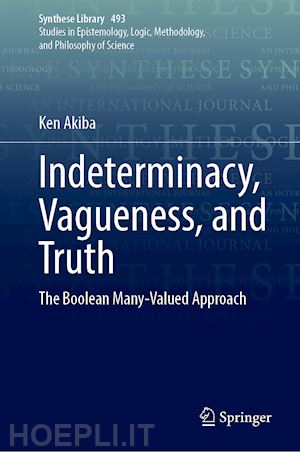

Questo prodotto usufruisce delle SPEDIZIONI GRATIS
selezionando l'opzione Corriere Veloce in fase di ordine.
Pagabile anche con Carta della cultura giovani e del merito, 18App Bonus Cultura e Carta del Docente
This book shows that the assumption that classical logic is essentially a bivalent (i.e., 2-valued) logic, a logic of truth and falsity, is an incorrect and harmful conception. Classical logic is certainly a Boolean logic, and the smallest (non-degenerate) Boolean algebra is the 2-element Boolean algebra; however, there are numerous Boolean algebras that have more than 2 elements, such as the 4-, 8-, 16-, ..., infinite-element Boolean algebra, and they all work equally well for the semantics of classical logic. Contrary to the popular thought, there is such a thing as classical (or Boolean) many-valued logic. The book applies this logic to solve such philosophical problems as the Fission Problem for personal identity, the Sorites Paradox, and the Liar Paradox. All these problems concern situations that involve indeterminacy or vagueness, situations where there seems 'no fact of the matter' that makes the relevant sentences true or false, thus requiring truth value gaps between truth and falsity. Because of that, classical logic has been thought to be an inadequate tool to deal with the problems. This book, however, offers solutions to those problems by retaining classical logic but assigning intermediate Boolean values to the relevant sentences. The book is of great value to researchers and graduate students in philosophy, especially for those who are interested in the philosophical issues surrounding indeterminacy, vagueness, and truth.
Preface.- Chapter 1. Boolean Many-Valued Logic.- Chapter 2. The Fission Problem and the Indeterminacy of Personal Identity.- Chapter 3. Vagueness, the Sorites Paradox and Precisifications.- Chapter 4. An Ontic Theory of Indeterminacy and Vagueness.- Chapter 5. Truth and the Liar Paradox.- Index.
Ken Akiba is an associate professor of philosophy at Virginia Commonwealth University. His areas of specialty are philosophical logic, philosophy of language, and metaphysics. His particular interest over the years has been on vagueness and indeterminacy. He has published papers on vagueness in such journals as Mind, Noûs, Synthese, and Journal of Philosophical Logic. He is the co-editor of Vague Objects and Vague Identity: New Essays on Ontic Vagueness (Springer, 2014) and author of The Philosophy Major's Introduction to Philosophy: Concepts and Distinctions (Routledge, 2021). His work on vagueness and indeterminacy has recently been featured in such introductory textbooks as Alyssa Ney, Metaphysics, 2nd edn. (Routledge, 2023), and Alessandro Torza, Indeterminacy in the World (Cambridge Elements in Metaphysics, 2023). He has just written an encyclopedia article on vagueness for H. Nesi & M. Pilin (eds.), International Encyclopedia of Language and Linguistics, 3rd edition (Elsevier).











Il sito utilizza cookie ed altri strumenti di tracciamento che raccolgono informazioni dal dispositivo dell’utente. Oltre ai cookie tecnici ed analitici aggregati, strettamente necessari per il funzionamento di questo sito web, previo consenso dell’utente possono essere installati cookie di profilazione e marketing e cookie dei social media. Cliccando su “Accetto tutti i cookie” saranno attivate tutte le categorie di cookie. Per accettare solo deterninate categorie di cookie, cliccare invece su “Impostazioni cookie”. Chiudendo il banner o continuando a navigare saranno installati solo cookie tecnici. Per maggiori dettagli, consultare la Cookie Policy.